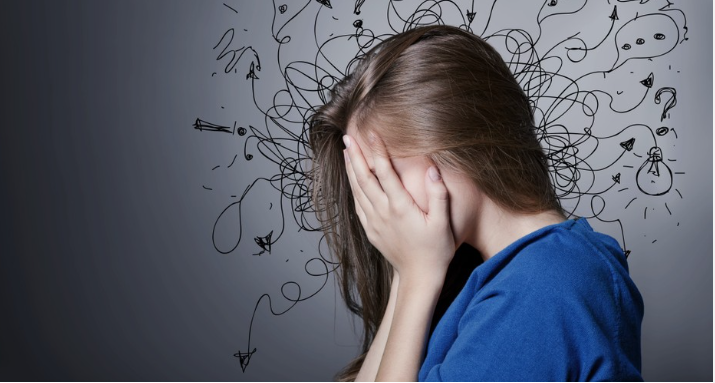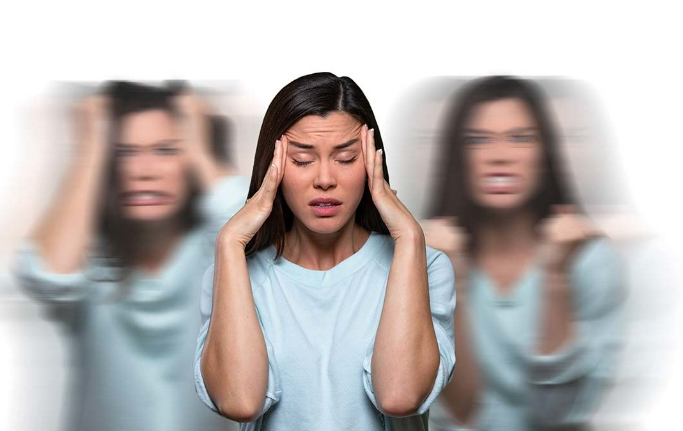Mental Health and Dementia
Learn about mental health and dementia to fully comprehend the individual’s requirements and what you can do to make them feel better.

Selfpause Affirmation App
Download the app to get 1,000’s of affirmation meditations and everything you need to write, record and listen to your own.
Managing the mental health of a person with dementia can be a challenge. While it is impossible to fully understand the individual’s needs, there are a few things you can do to help them feel better. By following some simple tips, you can improve their mental health and provide comfort and peace of mind.
Anxiety disorders

Despite the recent increase in awareness and concern about anxiety disorders in dementia, the optimal treatment is not clear. Nevertheless, several therapies may reduce the negative impact of anxiety on the patients and caregivers. These treatments should be explored in more controlled trials. In the meantime, this article offers a brief overview of the current state of knowledge on anxiety disorders in dementia.
The diagnosis of anxiety disorders in dementia is based on the presence of core symptoms of the disorder. The patient’s report of symptoms is the most common source of information. However, it may not be the best source of information in this case. Instead, a caregiver’s report may be more helpful.
However, there is no definitive link between anxiety disorders and dementia, and no systematic review has examined the relationship between these conditions. While depression and general anxiety are well known risk factors for dementia, an association between the two is unclear. To assess this, researchers conducted a systematic literature review. They included only studies in which anxiety symptoms were diagnosed or assessed in the participants.
Several studies have shown that anxiety in dementia patients can occur before the onset of dementia. For instance, a study of elderly people with mild cognitive impairment found that individuals with high anxiety scores had greater behavioral and psychological symptoms than those with low levels of anxiety. They also had a greater prevalence of sleep disorders and depression. In addition, high levels of anxiety impair executive function, a major indicator of cognitive health.
Depression

Many people with dementia also suffer from depression. However, finding the cause of depression can be challenging. In addition to dementia, other conditions such as sleep apnea and other medical problems can produce depression-like symptoms. In order to determine the underlying cause, it is important to assess the patient’s overall condition.
The Alzheimer’s Association’s vice president for support and care, Beth A. Kallmyer, says that depression evaluation should be a regular part of care for people with dementia. While depression is associated with memory loss, the condition can be treated. Drug treatments, however, can have side effects and may interact poorly with other medications.
Dementia may be accompanied by changes in behaviour, which can lead to depression. The person may become aggressive, agitated, or tearful. They may also have trouble sleeping or eating. Sometimes, these changes will lead to weight loss. Although symptoms of dementia and depression are similar, the two disorders are very different.
While there is no cure for dementia, it can be treated with medications, talking therapies, and cognitive stimulation. Alternative therapies, such as music therapy, aromatherapy, and reminiscence work, can also help the person suffering from dementia. The symptoms of depression and dementia are similar, so a person suffering from dementia may worry that they have depression.
Bipolar disorder

Researchers have linked mental disorders with the development of dementia in the elderly. This association has been found for people born between 15 and 39 years ago. Treatment for mental disorders during early adulthood may delay neurodegenerative diseases and increase the quality of life in old age. However, this has not been conclusively proven.
The results of this study show that people with bipolar disorder have a greater risk of developing dementia and dying earlier than those without bipolar disorder. This risk increases with age. Men with bipolar disorder had more than double the risk of dementia and death than men without the condition. The association between the two conditions is still unclear, although episodes of mania may affect cognitive functions.
The researchers’ study was based on information from a large cohort of older men in Perth, Australia. It included data from mental health records, hospital morbidity records, and death registries. However, the data they used were mostly from the 1960s and were not representative of current conditions.
Schizophrenia

The population with schizophrenia is growing, as is the number of people with dementia. The biggest risk factor for dementia is age, with up to 20% of over-80 year olds suffering from dementia. Among people with schizophrenia, the proportion is even higher. In addition, these individuals usually have poor physical health and an unhealthy lifestyle, which are both known vascular risk factors for dementia. However, there are few reliable studies linking these two conditions.
Fortunately, there are several medications available that have shown promise in patients with dementia and schizophrenia. The National Institute of Mental Health recommends clozapine, which is a medication used for the treatment of schizophrenia. Cognitive behavioral therapy is also available to ease the negative symptoms of the disease and improve functioning in everyday settings. Family education and support are also necessary for a complete treatment plan.
Doctors can make a diagnosis of schizophrenia by conducting a series of tests. These tests include brain scans and bloodwork. However, not all patients with dementia will develop symptoms of the disease. For this reason, doctors cannot use any one test to make the diagnosis definitively. They must make a diagnosis based on the patient’s symptoms, which may include hallucinations or delusions, socially unacceptable behaviors, and disconnection from reality.
Memory loss

When you are suffering from memory loss, your first step should be to visit your doctor. This will enable them to determine the underlying cause of the condition and create an effective treatment plan to improve your mental health and memory. Your doctor can also prescribe medication that can help improve your mood and reduce your anxiety.
While Alzheimer’s disease is the most common cause of dementia, other disorders can also cause similar symptoms. For instance, Parkinson’s disease, HIV infection, or Huntington’s disease can cause problems with memory. Another serious mental illness is schizophrenia, which causes confusion, delusions, and even hallucinations.
The good news is that there are many treatments available to address the symptoms of dementia, including talking therapy, cognitive behavioural therapy, and medication. Depending on the severity of the symptoms, you may also be able to benefit from alternative therapies, such as aromatherapy or music therapy. While most forms of talking therapy require that a person maintain some form of mental capacity, there are many benefits to talking therapy for people with dementia.
If you suspect your loved one has dementia, it’s important to get an early diagnosis from your doctor. While some forms of dementia are irreversible, others may not. Your doctor can use an FDG-PET scan to identify the causes of dementia, and other tests to determine if a person has any other underlying condition that may be affecting their mental health. The goal of therapy is to reduce symptoms and slow the progression of the condition.
Detection
Detection of mental health with dementia is an important part of dementia care. While the condition may appear harmless, it’s important to be aware of its dangers. This condition can be difficult to recognize because of the stigma associated with it. But if you notice changes in your loved one’s behavior or memory, it’s time to see a doctor.
Early diagnosis allows people with dementia and other mental illnesses to make the most of their abilities. It also prevents unnecessary hospitalizations, thereby increasing the quality of life for all concerned. Moreover, it can help them understand the landscape of dementia care and help them determine what resources they need.
Some of the common symptoms of dementia are hallucinations and delusions. These symptoms can cause a great deal of anxiety and paranoia. In addition, they can cause people to misidentify themselves or others, such as mirrors. Antipsychotic drugs may be prescribed to treat these conditions, but their side effects may be dangerous.
Detection of mental health with dementia requires a careful medical history. A doctor will ask you about your medical history, perform a mental status examination, and perform imaging tests to determine the extent of your loss of mental abilities. Once your doctor knows what type of dementia you have, he or she can prescribe treatments to help you cope with the symptoms.
Treatment

There is no single treatment for dementia, but there are many strategies that can improve your loved one’s mental health. Cognitive therapies focus on enhancing a person’s skills and achievements and can help them feel better. You can find more information on cognitive therapies and other activities through the Alzheimer’s Society.
If your loved one is suffering from memory loss, exercise can help. Although it is not possible to increase lifetime or immediate memory as we age, exercise is a great way to keep the mind active. Memory aids are also available to help the person remember things. Depression can also interfere with memory, so it is important to get help early. Studies have shown that 40-50% of people with Alzheimer’s disease have some degree of depressive symptoms. This is especially true for people who are in long-term residential care.
Psychoactive medications can improve cognitive abilities and prevent further decline in patients with dementia. A few of these drugs are cholinesterase inhibitors, a-tocopherol, and selegiline. Selegiline is approved for the treatment of Parkinson’s disease but is also being studied in dementia populations. NSAIDs, estrogen, and botanical agents are also being studied to improve cognitive functioning.
Our Top FAQ's
Common symptoms of mental health disorders in individuals with dementia may include depression, anxiety, agitation, and psychosis. These symptoms may manifest as changes in mood, behavior, or cognition.
Caregivers and family members can support the mental health of a loved one with dementia by providing a safe and supportive environment, engaging in activities that promote physical and mental well-being, and seeking help from healthcare professionals if necessary. It can also be helpful to communicate clearly and directly with the person with dementia, using simple language and nonverbal cues.
Dementia is a term used to describe a decline in cognitive functioning, including memory, language, and problem-solving skills. It can also affect a person’s mental health, as the changes in cognition and communication can lead to frustration, isolation, and loss of independence.
Some strategies for managing mental health symptoms in individuals with dementia may include medication, therapy, and supportive care. It can also be helpful to provide structure and routine, engage in activities that promote physical and mental well-being, and manage any physical health conditions that may be contributing to mental health symptoms.
While there is currently no cure for dementia, there are some interventions that may help to prevent or slow down its progression. These include maintaining a healthy lifestyle, engaging in mentally and physically stimulating activities, and managing any underlying health conditions. Mental health interventions such as therapy and medication may also be helpful in managing symptoms and improving overall quality of life. It’s important to note, however, that the effectiveness of these interventions can vary from person to person.
